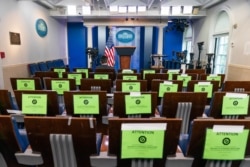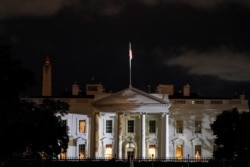President Donald Trump's age and weight put him at higher risk of a severe case of COVID-19, but beyond that his prognosis is hard to gauge, experts say.
Trump's doctor, Sean Conley, confirmed in a statement early Friday that the president and first lady Melania Trump had tested positive for the coronavirus. He said they "are both well at this time."
"I expect the President to continue carrying out his duties without disruption while recovering," he added.
Trump is 74 years old, and hospitalization rates rise steadily with age. People his age are hospitalized at a rate five times higher than 18-to-29-year-olds, according to the U.S. Centers for Disease Control and Prevention. Their death rate is 90-fold higher.
According to results from his most recent medical exam, Trump is 1.9 meters tall or 6-foot-3 and weighs just under 111 kilos or 244 pounds. That puts his body mass index at the low end of obese.
That triples his risk of hospitalization, according to the CDC.
"In general, somebody with those demographics you would have to watch very closely," said Amesh Adalja, an infectious disease physician and senior scholar at the Johns Hopkins Center for Health Security.
"But it doesn't necessarily mean that you are likely to have a severe case," he added.
"This virus has a different trajectory in each person," Adalja said. COVID-19 infections run the gamut from asymptomatic to lethal. "We don't know enough about why some people, even if they're in a high-risk group, have a mild illness and others don't."
One small study at a nursing home, where residents are at very high risk, found that more than one-third of those who tested positive for the coronavirus never developed symptoms.
World leaders testing positive
Trump joins several world leaders infected with the coronavirus with a range of results.
Brazilian President Jair Bolsonaro, 65, said in July that he had a mild case of COVID-19, which he dismissed as a "little flu."
British Prime Minister Boris Johnson, 56, said on March 27 that he had "mild symptoms," but was hospitalized 10 days later.
Honduran President Juan Orlando Hernandez, 51, also was briefly hospitalized with COVID-19. Guatemala's president, Alejandro Giammattei, 64, reported a "very mild" case. Alexander Lukashenko, leader of Belarus, 66, said he had an asymptomatic infection.
Isolation
Trump is experiencing "mild symptoms," White House Chief-of-Staff Mark Meadows said Friday.
Most people do not develop severe illness. But a small percentage of patients take a turn for the worse eight to 10 days after first reporting symptoms.
"That second week is very important for us to watch," said Helen Boucher, chief of infectious diseases at Tufts Medical Center.
Patients hospitalized in the second week can "become very ill even into the third and fourth week," she noted. "So, it can take time for this to play out."
The Trumps "plan to remain at home within the White House during their convalescence," Conley said.
The CDC recommends people isolate themselves for at least 10 days after symptoms first appear, as long as 24 hours have passed without a fever and other symptoms are improving.
That would take Trump off the campaign trail for more than a week with just over a month left before the election.
Even if his symptoms get no worse and he makes a speedy recovery, he may not be in full health at the end of 10 days.
"That's sometimes the case with people, that even if they have mild symptoms, they do take some time to recover to get back to their baseline," Adalja said.






